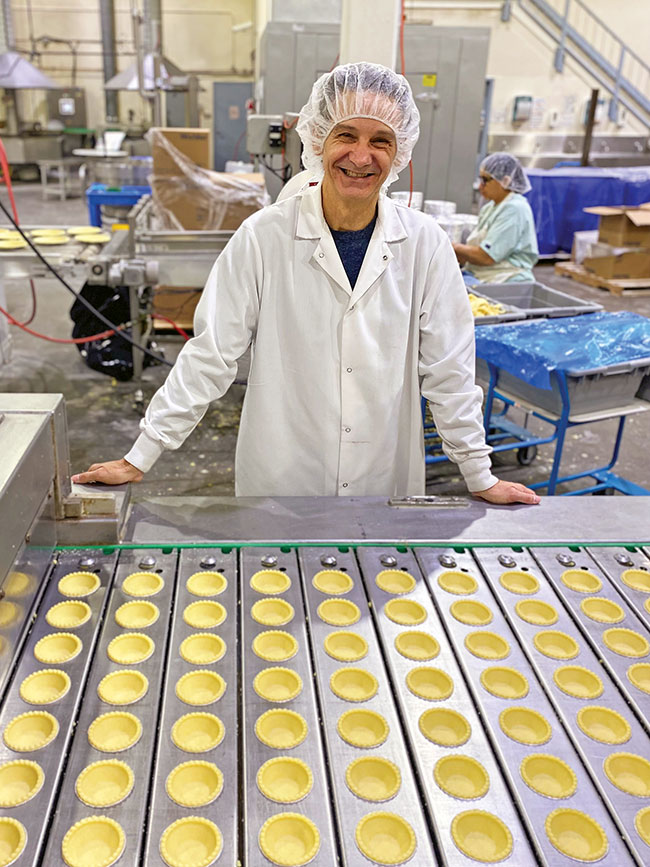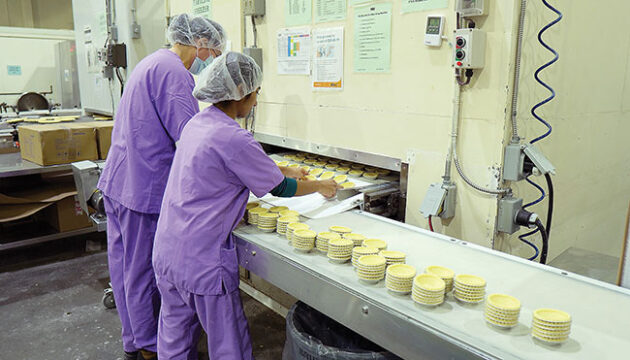
Profile: Mark-Crest Foods’ steady growth and automation
March 15, 2023
By
Colleen Cross
Mark-Crest Foods has found steady growth and paced automation the path to productivity
 Trent Glukler is president of the company started by his parents, Emil and Hilda Glukler, in 1963. “My father used to always say he wanted Michelin quality and McDonald’s consistency.”
PHOTOS: © RADEMAKER
Trent Glukler is president of the company started by his parents, Emil and Hilda Glukler, in 1963. “My father used to always say he wanted Michelin quality and McDonald’s consistency.”
PHOTOS: © RADEMAKER Mark-Crest Foods Ltd. in Langley, B.C., is a family-owned and -operated company that has grown sales by placing a high value on good-quality products, strong customer service and the well-being of their employees.
Founded in 1963 by Emil and Hilda Glukler, Mark-Crest began life in the basement of B.C. Ice & Cold Storage and began producing frozen tart shells and pizza crusts for a few clients. The company has since expanded to a location in Langley with customers across Canada and in the United States.
In its SQF-certified facility, the thriving business now produces nearly 300 products, including tart shells, pie shells, pie tops, puff pastry, fully baked heat-and-serve meat pies and appetizers.
When the company started, frozen foods were becoming relatively common. “My father was a pastry chef by trade, then an executive chef,” says son Trent Glukler, president. “He found that labour was becoming expensive and ingredients not so expensive. He saw a niche to create very high-quality products that chefs would be proud to use.”
Emil and Hilda met in 1953 coming over from Europe on the same ship, he from Switzerland and she from Germany. Trent says, “Father was trained as a pastry chef. He was going to California to start a candy company, ended up staying in Canada with Mother and the rest is history.”
Emil made a name for himself as a chef in the Harrison Hotel in Harrison Hot Springs, B.C., and in 1960-61 at the Biltmore, where he worked while building Mark-Crest, finally leaving to run the business full time while Hilda took care of the books. Older brother Michael started with the company in 1975 and Trent started in 1980. “They needed a truck driver and I started driving to help them out. I enjoyed it, stayed and learned the business from ground up: production, dough-making, foreman and president starting in the mid-1990s. Michael, now retired, still talks over the business with Trent and is occasionally called in to consult.
The factory is over 32,000 square feet with about 50 staff. “This year we’ve been hiring a number of university students part time one or two days a week,” Trent says. Some recent hires have been referrals from current employees. With several longtime employees, staffing is stable at Mark-Crest. This is due in part to their commitment to the principles of Lean, a system developed by Toyota for continuous process improvement that focuses on reducing and eliminating waste.
“In Japan they turn the power pyramid upside-down. People on the front lines are at the top, and as you move down the pyramid, it’s more about support. It’s been very successful for us and I think our staff feel more appreciated now than ever.”
“Everybody has a buy-in. That’s been huge for us, creating that culture of respect. We want them to stop the line if there is a problem.”

Mark-Crest employees handle pie shells for packaging.
Thoughtful automation
Mark-Crest’s path to automation started in the 1980s with a goal to alleviate employee fatigue. One Christmas, after struggling to keep up with tart production for about three-and-a-half months, they decided to make a change, Trent says. “The next year we bought ourselves a Rademaker automated tart line. After that we got a Rademaker puff pastry laminating line and a Rondo make-up line, then a Canol puff pastry sheeting line.”
When they spoke to Bakers Journal in December, Trent reported record high sales in November. They were looking to invest some of the profits from the Christmas season into equipment and considering buying a new automated pie line from Rademaker and adding to their x-ray machines that can identify a larger number of potential contaminants than can metal detectors.
For more on Mark-Crest’s journey, WATCH THIS VIDEO, courtesy Rademaker.
Staff usually welcome new equipment, he says. “In general, we try to target labour-intensive tasks. As a Lean manufacturer, we do things that may not pay off for another 10 years, but in keeping people we’re far ahead. For example, our vacuum lifts – staff can basically lift up bags or boxes of shortening or vegetable fats using two fingers. We didn’t save a lot of money by installing them. In the long run it works for everyone. It protects people’s backs and they go home not exhausted.”
“As I try to tell all our new staff, our working life is the most stressful part of our lives. Wouldn’t it be great if you came into your job every day and didn’t feel exhausted? You knew what to expect, you didn’t dread work?”
Trent reports that staff feel supported, not replaced, by automated equipment. “They know we don’t lay people off. When it’s quiet we put them to work on things like deep cleaning and special projects.”
Third generation
Anticipating retirement, Trent is pleased the family’s third generation – Trent’s niece Alora (Michael’s daughter) – aims to eventually lead the company and is learning the ropes. “I think she’ll do great. She’s a really nice person, she understands the culture, works in production and in the office. We’ve got a great team, including a fabulous head of QA who is intent on staying in a role that normally rotates.
He sums up their priorities: “We’re not growth driven. We’re not the biggest company. We want slow and steady growth spread over several customers.”
Print this page
Leave a Reply